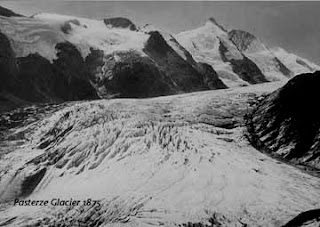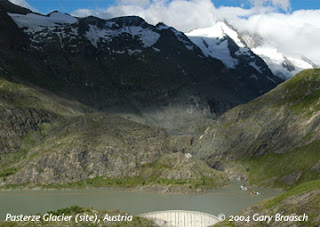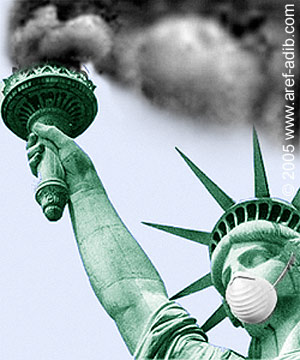Al Gore, Climate Scientists Share Nobel Peace Prize
 It's not an unmixed blessing, really: this "peace prize" named after the man who invented dynamite. Over the years it's been awarded to a seriously motley crew, including men of peace, semi-reformed terrorists, and at least one unrepentant mass murderer. So it goes.
It's not an unmixed blessing, really: this "peace prize" named after the man who invented dynamite. Over the years it's been awarded to a seriously motley crew, including men of peace, semi-reformed terrorists, and at least one unrepentant mass murderer. So it goes.
This year the honor is shared by an international panel of scientists and a former vice-president. Sharing the mixed blessing between a panel and an individual is perfect, in an ironic way; sharing it between politics and science is also perfect, but in another sense.
The scientists honored by this prize have been studying the Earth's climate for a long time, and the former politician has been presenting the gist of their research to a larger audience. In the grand scheme of things, both the research and the presentation are politically incorrect, in that they contradict the main story, and they have attracted the slime of powerful smear campaigns. But then again we've fallen so far through the looking glass that virtually anything important with more than a grain of truth in it is politically incorrect and bound to be smeared beyond recognition. So it goes.
Perhaps in the long run the award will raise the image of the honorees, and the work they've been doing. Perhaps it will simply bring them more slime. Nobody knows at this point.
In some ways, the timing couldn't be worse, with the slime machine in full swing. But in other ways the timing couldn't be better.
You see how mixed it all is? Nobody talks about it in these terms, of course. Everybody spins it differently.
The Nobel Committee writes of present-day realities as if they were future possibilities:
 The Nobel Peace Prize for 2007
The Nobel Peace Prize for 2007
The Norwegian Nobel Committee has decided that the Nobel Peace Prize for 2007 is to be shared, in two equal parts, between the Intergovernmental Panel on Climate Change (IPCC) and Albert Arnold (Al) Gore Jr. for their efforts to build up and disseminate greater knowledge about man-made climate change, and to lay the foundations for the measures that are needed to counteract such change.
Indications of changes in the earth's future climate must be treated with the utmost seriousness, and with the precautionary principle uppermost in our minds. Extensive climate changes may alter and threaten the living conditions of much of mankind. They may induce large-scale migration and lead to greater competition for the earth's resources. Such changes will place particularly heavy burdens on the world's most vulnerable countries. There may be increased danger of violent conflicts and wars, within and between states.
The two photos (thanks to Bluebear2) show an Austrian glacier as it looked in 1875 and the same site in 2004, and I would argue that all the changes mentioned by the committee are already happening. But then the committee must move more cautiously than any blogger.
They continue well, though, especially considering how they seem to be playing off the back foot:
Through the scientific reports it has issued over the past two decades, the IPCC has created an ever-broader informed consensus about the connection between human activities and global warming. Thousands of scientists and officials from over one hundred countries have collaborated to achieve greater certainty as to the scale of the warming. Whereas in the 1980s global warming seemed to be merely an interesting hypothesis, the 1990s produced firmer evidence in its support. In the last few years, the connections have become even clearer and the consequences still more apparent.
Al Gore has for a long time been one of the world's leading environmentalist politicians. He became aware at an early stage of the climatic challenges the world is facing. His strong commitment, reflected in political activity, lectures, films and books, has strengthened the struggle against climate change. He is probably the single individual who has done most to create greater worldwide understanding of the measures that need to be adopted.
By awarding the Nobel Peace Prize for 2007 to the IPCC and Al Gore, the Norwegian Nobel Committee is seeking to contribute to a sharper focus on the processes and decisions that appear to be necessary to protect the world’s future climate, and thereby to reduce the threat to the security of mankind. Action is necessary now, before climate change moves beyond man’s control.
Again they err on the side of caution, in my estimation. Global warming was much more than an interesting hypothesis even before the 1980s; it was already happening, we knew a lot about it, we knew about certain feedback mechanisms (though not all of them) and we knew that if and when we reached a certain point, it was game over.
Here's Al Gore:
I am deeply honored to receive the Nobel Peace Prize. This award is even more meaningful because I have the honor of sharing it with the Intergovernmental Panel on Climate Change -- the world's pre-eminent scientific body devoted to improving our understanding of the climate crisis -- a group whose members have worked tirelessly and selflessly for many years. We face a true planetary emergency. The climate crisis is not a political issue, it is a moral and spiritual challenge to all of humanity. It is also our greatest opportunity to lift global consciousness to a higher level.
My wife, Tipper, and I will donate 100 percent of the proceeds of the award to the Alliance for Climate Protection, a bipartisan non-profit organization that is devoted to changing public opinion in the U.S. and around the world about the urgency of solving the climate crisis.
Isn't that beautiful? The award is "even more meaningful" because Al has "the honor of sharing it". That's perfect; what else can one do with a mixed blessing but share it? And who else but a politician could put those words in that order?
I could get a lot more excited over this shared mixed blessing, except for the bit about how thirty years ago we knew that if and when we reached a certain point, it was game over. Well, that point was in our rear view mirror quite a while ago. But we passed it so long ago, and we were going so fast at the time, that we can't even see it anymore.
In other words, this "crisis" is so "urgent" that you'd need a time machine to solve it. And you'd have to go a long way back. And you'd have to do a lot of damage.

Nonetheless, I applaud the committee's selection. This game was lost ages ago, but the stalwarts are still banging away, hoping they're wrong about the prognosis, hoping for a miracle, hoping against hope and hoping against stark raving terror; and knowing all this, they hang on to the thinnest little scrap, because they know in their hearts that once all the hope is gone, there's nothing left of any value.
How do I know this? How could I not know? I blog about American politics, where the game was lost ages ago...

























































